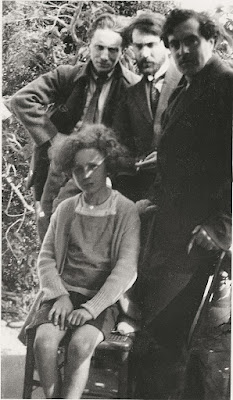JOYCE DIDONATO AT THE WIGMORE HALL, LONDON
JOYCE DIDONATO AT THE WIGMORE HALL, LONDON, 28th January, 2010
Last night I was at the Wigmore Hall to see an American soprano, Joyce DiDonato, a Yankee presumably of Italian origin but actually an Irish-American (real name: Joyce Flaherty). She sang some anitche arie, mostly of Italian origin, but some Italian song settings by Beethoven while he was a student of Salieri. The original poems were by Metastasio, whom Beethoven also met in Vienna. DiDonato's apparantly a big figure Stateside, now to be found in the Wigmore Hall, London, as the Royal Festival Hall presumably becomes oversubscribed. Also the audience in the Wigmore Hall is probably more musically sophisticated, something DiDonato alluded to throughout, in fact she seemed sometimes a bit over-awed.
Turning up early is a good idea in order to lap up the ambience. In the bar there were many photos of the greats: Jacqueline du Pre, Benjamin Britten, Yehudi Menuhin etc. It felt like a brush with history, although it would have been even more inspiring had one of the German Masters, Wagner, Mozart, visited, leaving a presumable calling card, but the Wigmore isn't that old (1900-01).
The antiche arie were mostly stereotypical Italian poems made into little songs or arriettes, mostly ending up as models for would-be singers to practise upon. The fantastic backdrop to the whole proceedings was an amazing Pre-Raphaelite, neo-classical or art noveau image placed above the stage, that seemed to summarise a scene from Dante. All the time my eye ran over the piece, but the music was fantastic. Basically DiDonato did some very clever things with some unprepossessing material. The songs themselves, especially the early ones, are packed with stereotypical images of loving couples parted or separated with all the usual nonsense about unrequited love. The accompianist, French pianist David Zobel, seemed a bit out of sorts for some reason, the piano sounded harsh as if he hadn't come to terms with the acoustics or the piano. The later songs boast of more intriguingly sophisticated lyrics, more modern sounding, plausible and ambiguous. Obviously its hard to do much with doggerel, so much pop music flounders on the basic incomprehensibility of what is being said, for the lyric has been tweaked so much that it isn't simply meaningless but bizarre (I have this particular problem with a lot of David Bowie's songs on his four most famous albums.)
Paul Murphy, London
Last night I was at the Wigmore Hall to see an American soprano, Joyce DiDonato, a Yankee presumably of Italian origin but actually an Irish-American (real name: Joyce Flaherty). She sang some anitche arie, mostly of Italian origin, but some Italian song settings by Beethoven while he was a student of Salieri. The original poems were by Metastasio, whom Beethoven also met in Vienna. DiDonato's apparantly a big figure Stateside, now to be found in the Wigmore Hall, London, as the Royal Festival Hall presumably becomes oversubscribed. Also the audience in the Wigmore Hall is probably more musically sophisticated, something DiDonato alluded to throughout, in fact she seemed sometimes a bit over-awed.
Turning up early is a good idea in order to lap up the ambience. In the bar there were many photos of the greats: Jacqueline du Pre, Benjamin Britten, Yehudi Menuhin etc. It felt like a brush with history, although it would have been even more inspiring had one of the German Masters, Wagner, Mozart, visited, leaving a presumable calling card, but the Wigmore isn't that old (1900-01).
The antiche arie were mostly stereotypical Italian poems made into little songs or arriettes, mostly ending up as models for would-be singers to practise upon. The fantastic backdrop to the whole proceedings was an amazing Pre-Raphaelite, neo-classical or art noveau image placed above the stage, that seemed to summarise a scene from Dante. All the time my eye ran over the piece, but the music was fantastic. Basically DiDonato did some very clever things with some unprepossessing material. The songs themselves, especially the early ones, are packed with stereotypical images of loving couples parted or separated with all the usual nonsense about unrequited love. The accompianist, French pianist David Zobel, seemed a bit out of sorts for some reason, the piano sounded harsh as if he hadn't come to terms with the acoustics or the piano. The later songs boast of more intriguingly sophisticated lyrics, more modern sounding, plausible and ambiguous. Obviously its hard to do much with doggerel, so much pop music flounders on the basic incomprehensibility of what is being said, for the lyric has been tweaked so much that it isn't simply meaningless but bizarre (I have this particular problem with a lot of David Bowie's songs on his four most famous albums.)
Paul Murphy, London

Comments